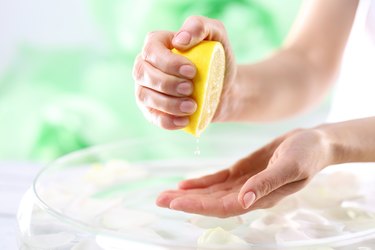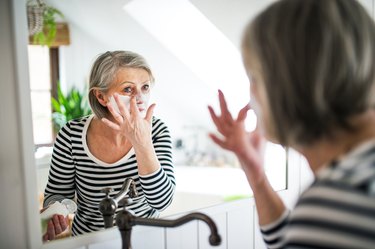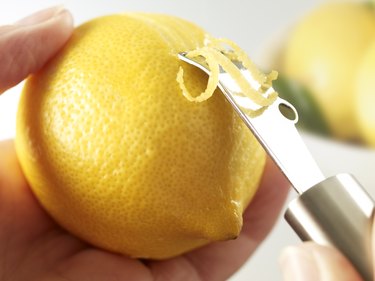
When life gives you lemons, make a face mask. At least that's what some beauty bloggers might have you believe. Plenty of people claim that using lemon juice or lemon peel can help clear up acne, reduce scarring, lighten dark spots and lead to glowing skin, all of which sounds amazing — and also like a great way to save money instead of buying pricey beauty products — but are those claims true?
Before you stock up on the sour citrus fruit, learn if any of lemon's supposed benefits for skin are for real. Here's what the science says:
Video of the Day
Video of the Day
Lemon for Hyperpigmentation and Dark Spots (Very Limited Evidence)
Sun exposure, some medications, genetics and hormonal changes can lead to hyperpigmentation, according to the Mayo Clinic. This condition, which causes dark areas of skin, is more common in people who have darker colored skin, but it can happen to anyone, according to the Cleveland Clinic. The hyperpigmentation can show up as tiny freckles or larger patches, per the American Osteopathic College of Dermatology.
Some people with hyperpigmentation wish to try to lighten their skin discoloration, and there are anecdotal reports that using lemon works. The thinking is that the citric acid exfoliates, while the ascorbic acid (a type of vitamin C) inhibits the production of melanin, the substance that gives our skin (and hair and eye irises) color.
But hold off on rubbing lemon on your face every day to try to remove dark spots or patches. You need a high dose of vitamin C — a concentration of at least 10 percent — to see any benefit, according to a February 2019 meta-analysis of 31 small, randomized, controlled clinical trials in the Journal of Clinical and Aesthetic Dermatology. The concentration of vitamin C in lemon juice is less than 4 percent, per the USDA. It's also important to keep in mind that the studies in this analysis only included white and Chinese adults, so we don't know if the findings apply to all skin types, and the research was on vitamin C, not specifically lemon juice.
Additionally, some people believe that the vitamin E in lemons can help with hyperpigmentation, but eating an entire lemon gives you less than one-hundredth of your daily E needs, per the USDA and National Institutes of Health. Plus, there's no evidence that vitamin E works for dark spots or skin lightening.
Warning
Keep in mind that applying lemon or any citrus juice can make your skin hypersensitive to the sun, according to the Cleveland Clinic. If you go outside after using lemon juice, you could get burned more easily. This could possibly contribute to dark spots over time, because, as we mentioned earlier, sun exposure is a cause of dark spots.
Lemon Juice for Pimples (No Evidence)
Can you get rid of acne with lemon? According to those who say yes, the citric acid in lemon juice has antibacterial and antifungal properties, which therefore help get rid of pimples.
But here's the thing: Yes, citric acid has antibacterial and antifungal benefits — per a January 2020 study in the Journal of Clinical Medicine and a February 2011 study in Comparative Clinical Pathology — but lemons only contain 1.44 g/oz of citric acid, which isn't a whole lot. Plus, no human clinical trials have been done to see if lemon juice helps with acne or could be an acne treatment.
Furthermore, using lemon on your face may cause skin irritation, according to a January 2020 review in Plants. Anecdotally, people report burning, redness and dryness, especially those with sensitive skin. In turn, this can actually make your acne worse, according to the American Academy of Dermatology.
Baking Soda and Lemon Juice for Acne (No Evidence)

People who swear by baking soda and lemon juice for your face say that it can help if you have acne, especially for blackheads on your nose. In addition to the benefits of lemon mentioned above, baking soda is thought to be anti-inflammatory and help balance your skin's pH level.
And yes, drinking baking soda (aka sodium bicarbonate) mixed with water appears to trigger an anti-inflammatory response in the body, according to a May 2018 study in the Journal of Immunology. But there have been no scientific trials in humans to determine just what baking soda and lemon do to your face.
As for pH, the typical range for our skin is 4.5 to 5.5. for people assigned female at birth and 4 to 5.5 for people assigned male at birth, according to a June 2017 study in the Journal of Clinical and Aesthetic Dermatology. That's somewhat acidic. Higher skin pH appears to encourage the growth of acne, the study reported. But baking soda is alkaline, with a pH of 8 to 9, per the National Library of Medicine. So if you put sodium bicarbonate on your skin, you may mess up the pH balance, causing dryness and irritation, which could make you more prone to breakouts.
The bottom line: Skip lemon juice and baking soda masks, scrubs or spot treatments.
Lemon Juice for Scars (No Evidence)
Search online and you'll see people saying that lemon juice fades or even removes scars — in particular, acne scarring. Here's the thinking: Lemon juice contains citric acid. Citric acid is a type of alpha hydroxy acid (AHA). In the skin-care world, AHAs are added to products to promote exfoliation and the removal of dead skin cells.
But there are no studies using citric acid for post-inflammatory hyperpigmentation (PIH), the scarring left behind after acne heals. More often, another AHA — glycolic acid — is used to treat PIH, according to a December 2013 study in Clinical, Cosmetic and Investigational Dermatology. (Lemon juice does not contain glycolic acid.)
Plus, skin-care products with AHAs are carefully formulated to provide the same amount of different acids in every batch, whereas the exact amount of citric acid varies from lemon to lemon, so you don't know how much you're getting.
Lastly, straight lemon juice may be too harsh on your skin, as mentioned above, which can lead to irritation.
Fresh vs. Bottled Lemon Juice
Bottled lemon juice may be an even worse idea for acne scars, because some bottled juices add preservatives and are made from lemon juice concentrate. The effects of these additional ingredients on skin are unknown.
Lemon Peel for Face Care (No Evidence)

Of course, lemon juice isn't the only part of a lemon you could use on your skin. Other supposed benefits of lemon on skin are all about the peel. Some say lemon peel helps with acne and that rubbing lemon on your face leads to smoother, glowing skin. But few sites that make this claim give any explanation on exactly how that all works.
Like lemon juice, lemon peel contains ascorbic acid — but that doesn't equate to being good at fighting acne. There are no human studies looking at lemon peel for skin lightening, acne or any other dermatological uses.
Lemon Essential Oil for Skin (No Evidence)
Different essential oils may help with stress, sleep, headaches and more. But there is no scientific evidence that lemon oil has benefits for skin.
The Bottom Line
Although your friend or a TikTok or Instagram star may tell you that lemon juice works wonders for your skin, the research does not support most of these claims. Whether you're interested in lightening dark spots, clearing up acne, reducing scarring or anything else, there's just not enough evidence to support trying lemon juice for skin.
If you still wish to give it a shot, definitely use fresh lemon juice rather than bottled lemon juice to avoid any preservatives or other added ingredients. Also be sure to test your skin first with a very small application of lemon juice. That way you can check for any burning, irritation or other negative side effects before you apply it to a larger area of skin.
Don't forget that if you have any skin concerns or questions, it's always smart to see a dermatologist. They can recommend home, over-the-counter or prescription treatments and then follow up with you to see if those things are working or if you should try something else.
- U.S. National Library of Medicine: "Melanin"
- Journal of Clinical and Aesthetic Dermatology: "Vitamin C Prevents Ultraviolet-induced Pigmentation in Healthy Volunteers: Bayesian Meta-analysis Results from 31 Randomized Controlled versus Vehicle Clinical Studies"
- Cleveland Clinic: "Lime Juice and Sunshine Can Make for Painful, Unexpected Sunburn"
- Journal of Clinical Medicine: "Antibacterial Activity of Some Flavonoids and Organic Acids Widely Distributed in Plants"
- Comparative Clinical Pathology: "Evaluation of inhibitory effects of citric and tartaric acids and their combination on the growth of Trichophyton mentagrophytes, Aspergillus fumigatus, Candida albicans, and Malassezia furfur"
- Journal of Immunology: "Oral NaHCO3 Activates a Splenic Anti-Inflammatory Pathway: Evidence That Cholinergic Signals Are Transmitted via Mesothelial Cells"
- Journal of Clinical and Aesthetic Dermatology: "Skin Surface pH in Acne Vulgaris: Insights from an Observational Study and Review of the Literature"
- U.S. National Library of Medicine: "Sodium bicarbonate"
- American Osteopathic College of Dermatology: "Hyperpigmentation"
- Mayo Clinic: "Mayo Clinic Q and A: Treating melasma"
- Cleveland Clinic: "Melasma"
- American Osteopathic College of Dermatology:"Hyperpigmentation"
- Clinical, Cosmetic and Investigational Dermatology: "Glycolic Acid Peel Therapy – A Current Review"
- National Institutes of Health: "Vitamin E Fact Sheet for Consumers"
- USDA Food Data Central: "Lemon Juice, Raw"
- Plants: "Citrus limon (Lemon) Phenomenon—A Review of the Chemistry, Pharmacological Properties, Applications in the Modern Pharmaceutical, Food, and Cosmetics Industries, and Biotechnological Studies"
- American Academy of Dermatology: "10 Skin Care Habits That Can Worsen Acne"
- Journal of Endourology: "Quantitative Assessment of Citric Acid in Lemon Juice, Lime Juice, and Commercially-Available Fruit Juice Products"
Is this an emergency? If you are experiencing serious medical symptoms, please see the National Library of Medicine’s list of signs you need emergency medical attention or call 911.